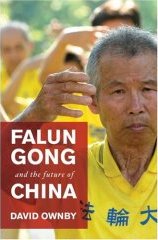
Quick Link
for your convenience!
Human
Rights, Youth Voices etc.
For
Information Concerning the Crisis in Darfur
Whistleblowers
Need Protection

|
|
|
|
Falun Gong and the Future of China
By David Ownby, Oxford University Press, Mar 2008
|

ISBN13: 9780195329056
ISBN10: 0195329058
Hardback, 312 pages
Mar 2008 (Not Yet Published due Mar 17 2008)
Price: $29.95 (01)
|
Description
On April 25, 1999, ten thousand Falun Gong practitioners gathered outside Zhongnanhai, the guarded compound where China's highest leaders live and work, in a day-long peaceful protest of police brutality against fellow practitioners in the neighboring city of Tianjin. Stunned and surprised, China's leaders launched a campaign of brutal suppression against the group which continues to this day. This book, written by a leading scholar of the history of this Chinese popular religion, is the first to offer a full explanation of what Falun Gong is and where it came from, placing the group in the broader context of the modern history of Chinese religion as well as the particular context of post-Mao China.
Falun Gong began as a form of qigong , a general name describing physical and mental disciplines based loosely on traditional Chinese medical and spiritual practices. Qigong was "invented" in the 1950s by members of the Chinese medical establishment who were worried that China's traditional healing arts would be lost as China modeled its new socialist health care system on Western biomedicine. In the late 1970s, Chinese scientists "discovered" that qi possessed genuine scientific qualities, which allowed qigong to become part of China's drive for modernization. With the support of China's leadership, qigong became hugely popular in the 1980s and 1990s, as charismatic qigong > masters attracted millions of enthusiastic practitioners in what was known as the qigong boom, the first genuine mass movement in the history of the People's Republic.
Falun Gong founder Li Hongzhi started his own school of qigong in 1992, claiming that the larger movement had become corrupted by money and magic tricks. Li was welcomed into the qigong world and quickly built a nationwide following of several million practitioners, but ran afoul of China's authorities and relocated to the United States in 1995. In his absence, followers in China began to organize peaceful protests of perceived media slights of Falun Gong, which increased from the mid-'90s onward as China's leaders began to realize that they had created, in the qigong boom, a mass movement with religious and nationalistic undertones, a potential threat to their legitimacy and control.
Based on fieldwork among Chinese Falun Gong practitioners in North America and on close examinations of Li Hongzhi's writings, this volume offers an inside look at the movement's history in Chinese popular religion.
Features
- The first book to explain the nature and origin of Falun Gong, the religious group brutally suppressed by China's political leaders
Reviews
"Falun Gong and the Future of China challenges students of Chinese society and politics to reconsider the continued influence of religiosity in the narrative of modern China. Touching on ancient history, peasant rebellions, religious revivals, Chinese medicine, the qigong movement, diaspora studies, the Internet in China, Communist Party politics, and more, Ownby uncovers the rich layers of context which are essential to understanding the Falun Gong issue. The book, written in clear, engaging and often humorous prose, will be an invaluable resource for specialists and general readers alike. David A. Palmer, author of Qigong Fever: Body, Science and Utopia in China<$>
"In his splendid book, David Ownby takes you behind the images of self-immolating protesters, baton-wielding security personnel, and a unique religious and political phenomenon to place Falun Gong, perhaps the most important mass movement in China in decades, in its historical context. This book is crucial to anyone seeking to understand the role that religion and the search for meaning play in today's China." --John Pomfret, author of Chinese Lessons: Five Classmates and the Story of the New China
"In a readable style that will appeal to the general reader while satisfying the demands of specialists, Ownby makes a hugely important contribution to our understanding of Falun Gong. To situate Falun Gong in its full context, past and present, is to lay the basis for a fair and full assessment. No other book on the subject has yet done this. There are so many crucial elements here that are missing from other works on the subject: Falun Gong's deliberate efforts to affiliate itself to science, its less deliberate links to the religious movements of China's past, the revival of spirituality in post-Mao China, and the regime's crisis of legitimacy. Above all, this book shows the deadly consequences of the blindness of those within and without the movement to China's own religious history." --Michael Szonyi, John Loeb Associate Professor of Chinese History, Harvard University, and author of Cold War Island: Quemoy on the Frontlines
Product Details
312 pages; 15 halftones; 6-1/8 x 9-1/4; ISBN13: 978-0-19-532905-6ISBN10: 0-19-532905-8
About the Author(s)
David Ownby is Professor of History and Director of the Center for East Asian Studies at the Université de Montréal, in Montreal, Canada. He is the author of Brotherhoods and Secret Societies in Early and Mid-Qing China: The Origins of a Tradition, and the co-author, with Qin Baoqi and Susan J. Palmer, of The Millennium and the Turning of the Kalpa: The Historical Evolution of Apocalyptic Discourse in China and in the West .
|
|
